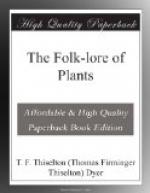“The corn in this cold country,” writes Ray, “exposed to the winds, bleak and shelterless, is very backward at the first, but afterwards overtakes the forwardest in the country, if not in the barn, in the bushel, both for the quantity and goodness thereof.” According to the Italians, “Every grain hath its bran,” which corresponds with our saying, “Every bean hath its black,” The meaning being that nothing is without certain imperfections. A person in extreme poverty is often described as being “as bare as the birch at Yule Even,” and an ill-natured or evil-disposed person who tries to do harm, but cannot, is commonly said to:—
“Jump at it like a cock at a gooseberry.”
Then the idea of durableness is thus expressed in a Wiltshire proverb:—
“An eldern stake and a blackthorn
ether [hedge],
Will make a hedge to last for ever”—
an elder stake being commonly said to last in the ground longer than an iron bar of the same size.[1]
A person who is always on the alert to make use of opportunities, and never allows a good thing to escape his grasp, is said to “have a ready mouth for a ripe cherry.” The rich beauty, too, of the cherry, which causes it to be gathered, has had this moral application attached to it:—
“A woman and a cherry are painted for their own harm.”
Speaking of cherries, it may be mentioned that the awkwardness of eating them on account of their stones, has given rise to sundry proverbs, as the following:—
“Eat peas with the king, and cherries with the beggar,”
and:—
“Those that eat cherries with great
persons shall have their eyes
squirted out with the stones.”
A man who makes a great show without a corresponding practice is said to be like “fig-tree fuel, much smoke and little fire,” and another adage says:—
“Peel a fig for your friend, and a peach for your enemy.”
This proverb, however, is not quite clear when applied to this country. “To peel a fig, so far as we are concerned,” writes Mr. Hazlitt[2], “can have no significance, except that we should not regard it as a friendly service; but, in fact, the proverb is merely a translation from the Spanish, and in that language and country the phrase carries a very full meaning, as no one would probably like to eat a fig without being sure that the fruit had not been tampered with. The whole saying is, however, rather unintelligible. ‘Peeling a peach’ would be treated anywhere as a dubious attention.”
Of the many proverbs connected with thorns, there is the true one which tells us how,
“He that goes barefoot must not plant thorns,”
The meaning of which is self-evident, and the person who lives in a chronic state of uneasiness is said to, “sit on thorns.” Then there is the oft-quoted adage:—
“While thy shoe is on thy foot, tread upon the thorns.”




